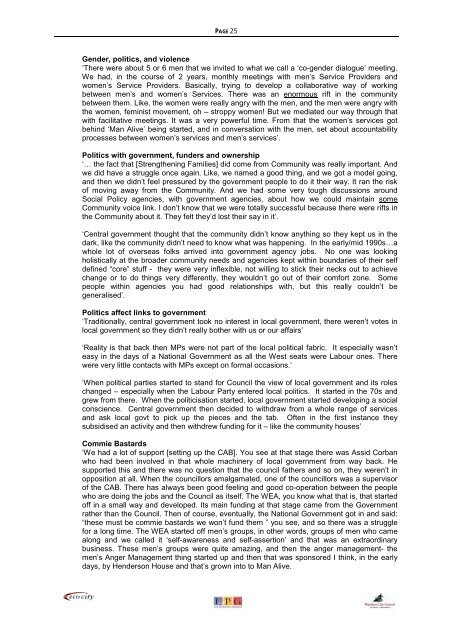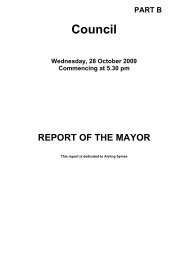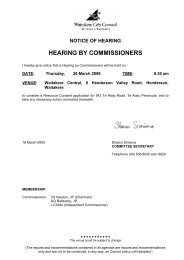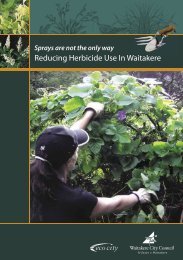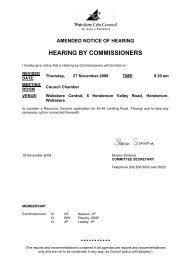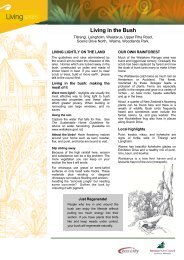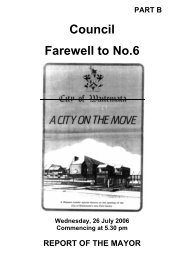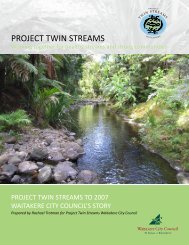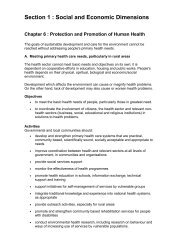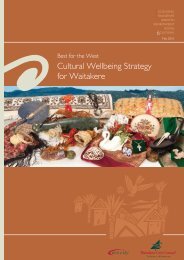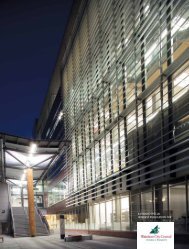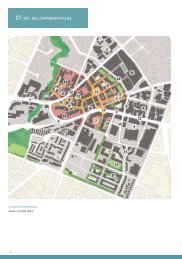The Waitakere Way - Looking Back, Going Forward - Auckland Council
The Waitakere Way - Looking Back, Going Forward - Auckland Council
The Waitakere Way - Looking Back, Going Forward - Auckland Council
Create successful ePaper yourself
Turn your PDF publications into a flip-book with our unique Google optimized e-Paper software.
PAGE 25Gender, politics, and violence‘<strong>The</strong>re were about 5 or 6 men that we invited to what we call a ‘co-gender dialogue’ meeting.We had, in the course of 2 years, monthly meetings with men’s Service Providers andwomen’s Service Providers. Basically, trying to develop a collaborative way of workingbetween men’s and women’s Services. <strong>The</strong>re was an enormous rift in the communitybetween them. Like, the women were really angry with the men, and the men were angry withthe women, feminist movement, oh – stroppy women! But we mediated our way through thatwith facilitative meetings. It was a very powerful time. From that the women’s services gotbehind ‘Man Alive’ being started, and in conversation with the men, set about accountabilityprocesses between women’s services and men’s services’.Politics with government, funders and ownership‘… the fact that [Strengthening Families] did come from Community was really important. Andwe did have a struggle once again. Like, we named a good thing, and we got a model going,and then we didn’t feel pressured by the government people to do it their way. It ran the riskof moving away from the Community. And we had some very tough discussions aroundSocial Policy agencies, with government agencies, about how we could maintain someCommunity voice link. I don’t know that we were totally successful because there were rifts inthe Community about it. <strong>The</strong>y felt they’d lost their say in it’.‘Central government thought that the community didn’t know anything so they kept us in thedark, like the community didn’t need to know what was happening. In the early/mid 1990s…awhole lot of overseas folks arrived into government agency jobs. No one was lookingholistically at the broader community needs and agencies kept within boundaries of their selfdefined “core” stuff - they were very inflexible, not willing to stick their necks out to achievechange or to do things very differently, they wouldn’t go out of their comfort zone. Somepeople within agencies you had good relationships with, but this really couldn’t begeneralised’.Politics affect links to government‘Traditionally, central government took no interest in local government, there weren’t votes inlocal government so they didn’t really bother with us or our affairs’‘Reality is that back then MPs were not part of the local political fabric. It especially wasn’teasy in the days of a National Government as all the West seats were Labour ones. <strong>The</strong>rewere very little contacts with MPs except on formal occasions.’‘When political parties started to stand for <strong>Council</strong> the view of local government and its roleschanged – especially when the Labour Party entered local politics. It started in the 70s andgrew from there. When the politicisation started, local government started developing a socialconscience. Central government then decided to withdraw from a whole range of servicesand ask local govt to pick up the pieces and the tab. Often in the first instance theysubsidised an activity and then withdrew funding for it – like the community houses’Commie Bastards‘We had a lot of support [setting up the CAB]. You see at that stage there was Assid Corbanwho had been involved in that whole machinery of local government from way back. Hesupported this and there was no question that the council fathers and so on, they weren’t inopposition at all. When the councillors amalgamated, one of the councillors was a supervisorof the CAB. <strong>The</strong>re has always been good feeling and good co-operation between the peoplewho are doing the jobs and the <strong>Council</strong> as itself. <strong>The</strong> WEA, you know what that is, that startedoff in a small way and developed. Its main funding at that stage came from the Governmentrather than the <strong>Council</strong>. <strong>The</strong>n of course, eventually, the National Government got in and said:“these must be commie bastards we won’t fund them ” you see, and so there was a strugglefor a long time. <strong>The</strong> WEA started off men’s groups, in other words, groups of men who camealong and we called it ‘self-awareness and self-assertion’ and that was an extraordinarybusiness. <strong>The</strong>se men’s groups were quite amazing, and then the anger management- themen’s Anger Management thing started up and then that was sponsored I think, in the earlydays, by Henderson House and that’s grown into to Man Alive.


